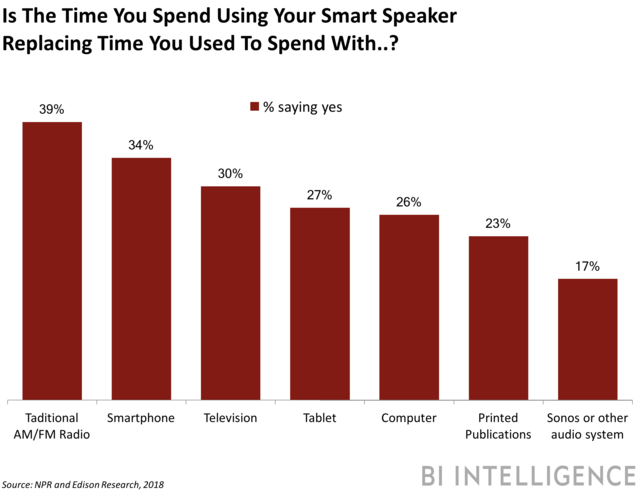US consumers are depending more on smart speakers

BI Intelligence
This story was delivered to BI Intelligence Apps and Platforms Briefing subscribers hours before appearing on Business Insider. To be the first to know, please click here.
As smart speakers become more ubiquitous in the home, consumers are becoming more reliant on them, according to a new report from NPR and Edison Research.
Smart speakers are on track to become a permanent fixture in many households, as 65% of respondents say they wouldn’t want to go back to their life without their smart speaker.
Consumers’ dependence on smart speakers goes so far that 38% of respondents plan to buy an additional smart speaker. Smart speakers, and the voice assistants embedded in them, bring an added layer of convenience to the lives of consumers who adopt them, as they serve as a central hub for consumers' digital experience in the home.
The report yielded three key findings in the evolving smart speaker market:
Usage of smart speakers among owners increases with time. Fifty-one percent of smart speaker owners use the device more often than they did in their first month of ownership. Only 16% of smart speaker owners say they use the device less often compared to the first month of owning it.
Smart speakers are cannibalizing usage of other technology including traditional radio, smartphones, TVs, and tablets. Thirty-nine percent of smart-speaker owners say their speaker is replacing time spent with traditional AM/FM radio, 34% say it's replacing smartphone usage, 30% say TV usage, and 27% say tablet usage. Meanwhile, 17% of consumers say the time they spend using their smart speaker is replacing that of traditional speakers — this is notable considering the devices are, at their core, speakers.
Smart speakers are spurring usage of voice assistants on other platforms.Fourty-four percent of smart speaker owners are using their voice assistant on their smartphone more since receiving a smart speaker. And 64% of smart speaker owners are interested in using the technology in their cars.
The findings highlight the massive opportunity for uptake of audio-focused smart speakers. The report suggests that the audio quality of smart speakers may not compare to that of traditional speakers considering 83% of respondents still rely on their traditional speaker devices to listen to music.
Samsung, which plans to release a Bixby-powered smart speaker in 2018, has the greatest opportunity in this realm. The company plans to focus on the audio quality of its smart speaker to help set its device apart from Amazon's and Google's smart speakers, both of which lag in audio quality, according to Strategy Analytics.
Peter Newman, research analyst for BI Intelligence, has put together a Smart Speaker report that analyzes the market potential of the Echo Look, Echo Show, and HomePod. Using exclusive survey data, this report evaluates each device's potential for adoption based on four criteria: awareness, excitement, usefulness, and purchase intent. Finally, the report draws some inferences from our data about the direction the smart speaker market could take from here.
Here are some of the key takeaways:
Amazon's new Echo Show is the big winner — it has mass-market appeal and looks like it will take off. The combination of usefulness and excitement will drive consumers to buy the Echo Show. The Echo Look, though, seems like it will struggle to attract that same level of interest.
Apple’s HomePod looks likely to find a place in the smart speaker market but won’t dominate its space like the iPhone or iPad did.
The smart speaker market will evolve rapidly in the next few years, with more devices featuring screens, a variety of more focused products emerging, and eventually, the voice assistant moving beyond the smart speaker.
In full, the report:
Showcases exclusive survey data on initial consumer reactions to the Echo Look, Echo Show, and HomePod.
Highlights the aims and strategies of major players in the smart speaker market.
Provides analysis on the direction this nascent market will take and the opportunity for companies considering a move into the space.
Interested in getting the full report? Here are two ways to access it:
Subscribe to an All-Access pass to BI Intelligence and gain immediate access to this report and over 100 other expertly researched reports. As an added bonus, you'll also gain access to all future reports and daily newsletters to ensure you stay ahead of the curve and benefit personally and professionally. >> Learn More Now
Purchase & download the full report from our research store. >> Purchase & Download Now
See Also:

 Yahoo Finance
Yahoo Finance 
